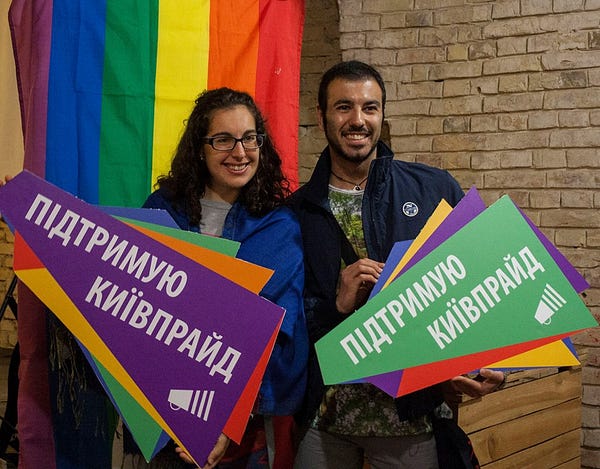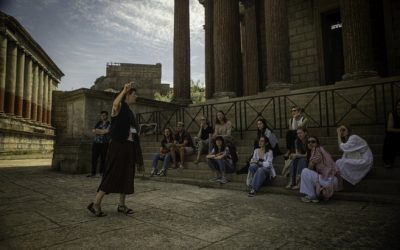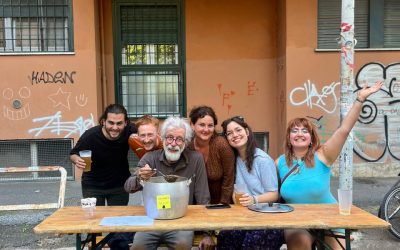Gender
“Usual Minority”: What Foreign Activists Saw during Kyiv Equality March
The project took place in:
Ukraine
Workcamp
Written by Viktoria Grivina
or What I Learnt about LGBTQ during Kyiv Pride 2016
The program of “KyivPride 2016” included round table on the rights of LGBT (lesbian, gay, bisexual, and transgender)people in Ukraine, discussions on the development of the LGBT movement, training on educational activities for students, films about Ukrainian Pride and LGBT movement, exhibitions by Ukrainian and German civil initiatives, cultural recreational activities for the LGBT community and supporters. Equality March took place as a part of the International Forum “KyivPride 2016”. This was a peaceful demonstration in support of the idea of the need to respect human rights, regardless of sexual orientation, gender identity or any other markers. The program of KyivPride attended by activists from all regions of Ukraine, representatives of LGBT organizations from EU countries.

The march itself was organized under a silent motto “if someone gets killed, they’ll never let us in EU ever.” This motto was shared even by right wing extremists who stopped at YouTube threats and one beaten boy who was naive enough to post photos on every metro station he passed returning from the March.
Post-Soviet countries somehow naturally decided that defense of LGBT rights should be the responsibility of… LGBT. And they simply accepted the situation. So when my group of international volunteers were uncovered as “non-LGBT” while helping set up the room for one discussion, it took time to see through the barrier and understand one another (which we did in the end).
But at first I was lost in terminology and was scared to ask what was the 5th letter some put after LGBT (turns out its Q for Queer). Fears were not entirely paranoid. One of our participants suddenly asked, “why don’t you tell more about these health problems to us, “usual” people”. All the heads in the audience turned to our group. Some uncomfortable three minutes of silence followed. The girl tried to correct herself “I mean, I ask as a friend, I volunteer here for a week already… “ Then a fierce looking activist stood up an said “So what are you doing here such normal people, what came to “save” us?” At this point I thought, “to be beaten by gays at the Pride, how very much in my style.”
But almost at once several other activists stood up to defend us. One was symbolically clinical psychologist, who remarked that it’s better to explain, not judge. For me it was ultimately a fantastic lesson at what it feels like to be “other” in the crowd with a target on your back. Only unlike Kyiv Pride activists people on the streets would not be as understanding, surely.
For this week I also experienced how people react if they see you as LGBT. At the opening of peace week police stood in two lines, guarding the way from entrance, and I had to go to the toilet between two rows of armed men staring at you, trying to guess weather I’m a hidden terrorist or a transvestite with a 35 shoe size. On the plus side for the first time in months i saw the whole content of my bag and even found a lost metro coin.
It took a week of seminars to make the tension go away. Activists turned out to be clever and fun, and police stopped searching the bones of my back and, unable to figure me out, started saying ‘hi’ and even holding doors.
There was something to laugh about too. Like a very elaborate sign «безпека для всіх» (security for all) that due to a glitch in turning letters for some time had b in для, making it a rather obnoxious piece of “fuck all” banner.
To a traditional for these week question if they were afraid, Sarah and Carlo gave the same answer,
“Strangely, no.”
After a week of threatening videos about killings on prides all around the world, it really was an unusual answer.

“ at some point,” adds Sarah, “I even thought something broke in my head if i don’t feel any fear. And it’s the main difference from the prides I’ve been to in Lisbon. I mean we also have some conflicts, but it’s already past the stage of life threat and thousands of police force taking you away in guarded buses. I mean, isn’t safety the most basic thing that any society should give you?
On the other hand, Sarah doesn’t think that to live in Europe is a sugary paradise either.
“Take my example. I grew up in a small village far from Lisbon. And ok maybe at home nobody beat any gay people, but what people around me said wasn’t exactly nice too. Only when I came to Lisbon I realized that I am allowed to live a different life. Suddenly I didn’t need to hide. I became… alive for the first time. The level of activism in student community was high, I got to meet like-minded folks. Going to prides was a usual thing, no matter if you belinged to the community or not. I went 6 times.
But at home things were same old. Once I came home for holidays. We were eating dinner and watching TV. The news showed debates about legalization of same-sex marriages and adoption rights. As usual dad started his speech, like how it’s wrong and outrageous and so on. And this time I decided to speak up. We started arguing, I think we never shouted at each other so much. And then he suddenly understood everything. He stopped. Never before I’ve seen another person’s face change to yellow like wax. His body started trembling, he shook his head and went on repeating, “No, this is not true, you can’t be that… just don’t tell me you are like that… you can’t do this with us.” He couldn’t even pronounce ‘lesbian’. Instead of reassuring him I shouted, “And what if I am?!” I didn’t even need to finish the sentence. He shook and shook his head, and then we stopped talking to each other. For 3 months. For our family it’s crazy long.
 Photo by Yana Nyzhegorodova
Photo by Yana Nyzhegorodova
What surprised me was when we started to speak again his tone changed completely. He started choosing his expressions. He tried to be nicer like that argument never happened and we never mentioned it. Then one time my mother and grandma were discussing LGBT, and grandma said something particularly nasty. And my dad put his hand on grandma’s shoulder and said, “Don’t say that. We can’t say such things any more,” — and looked at me apologetically. That’s how our adaptation goes.
A Russian activist said something similar on one workshop:
“Don’t know where this legend about Netherlands as a symbold of “Gayropa” came from. They aren’t even in the top ten most tolerant European states. Try going 40 km from Amsterdam in a village and you’ll face the same homophobic mood.”
An Italian volunteer Carlo lives in Cagliari, Sardinia. They had their first Pride 3 years ago:
“I was very nervous. Everybody were thinking, ‘how it’s all gonna go, what will locals do, what if there’ll be no people? Or only violent ones? What will old generation think?’ What really happened I didn’t expect — the whole city went, it was like a holiday, all went, including fishermen and old men.”
Looking at the wave of people under their window Carlo’s grandma dragged him out too: “She’s a psychologist. She knew about me for ages and helped my parents to accept it too. My other grandma is completely different story, she’s from the village, and every time she hears something, she starts crossing, “What, man with man?! No, god will never let this happen.” It’s not likely that Carlo opens up to her any time soon:
“I can’t say that the are are no homophobes in Cagliari. But what can they do against the whole town? If they protest, the crowd will just laugh.

Actually Kyiv made me realize I had a lot of fears that were only in my head, — smiles Carlo. — When I walked down the street and somebody looked at me strange. I could never even hold hands in public. Now here we faced real physical danger and I was not afraid a single minute. This made me think, I should really use the freedom we have in Italy. when I come back I’ll feel better walking down those streets. Maybe I will even hold someone’s hand”.
Article written by Viktoria Grivina (SVIT-Ukraine), Workcamp Supporting ‘KyivPride 2016’, June 2016
Published here.
You can still join!
Want to have your own volunteer experience for peace?
Read more Voices of Volunteers




